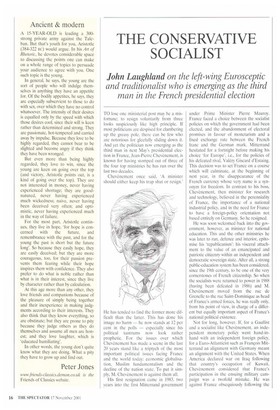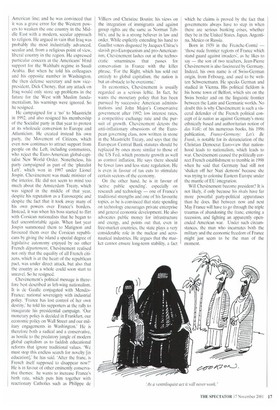THE CONSERVATIVE SOCIALIST
John Laughland on the left-wing Eurosceptic
and traditionalist who is emerging as the third man in the French presidential election
TO lose one ministerial post may be a misfortune; to resign voluntarily from three looks suspiciously like high principle. If most politicians are despised for clambering up the greasy pole, there can be few who are notorious for gleefully sliding down it. And yet the politician now emerging as the third man in next May's presidential election in France, Jean-Pierre Chevenement, is known for having stomped out of three of the four top ministries he has run over the last two decades.
Chevenement once said, 'A minister should either keep his trap shut or resign.'
He has tended to find the former more difficult than the latter. This has done his image no harm he now stands at 12 per cent in the polls — especially since his political tantrums now look rather prophetic. For the issues over which Chevenement has made a scene in the last 20 years stand like a triptych of the most important political issues facing France and the world today: economic globalisation, Muslim fundamentalism and the decline of the nation state. To put it simply, M. Chevenement is against them all.
His first resignation came in 1983, two years into the first Mitterrand government under Prime Minister Pierre Mauroy. France faced a choice between the socialist policies on which the government had been elected, and the abandonment of electoral promises in favour of monetarism and a fixed exchange rate between the French franc and the German mark. Mitterrand hesitated for a fortnight before making his choice 'for Europe', i.e., for the policies of his defeated rival, Valery Giscard d'Estaing. This decision was to set France on a course which will culminate, at the beginning of next year, in the disappearance of the French currency whose very name is a synonym for freedom. In contrast to his boss, Chevenement, then minister for research and technology, believed in the perenniality of France, the importance of a national industrial policy, and in the need for France to have a foreign-policy orientation not based entirely on Germany. So he resigned.
He was soon welcomed back into the government, however, as minister for national education. This and the other ministries he was later to run, defence and interior, epitomise his 'republicanism': his visceral attachment to the value of an emancipated and patriotic citizenry within an independent and democratic sovereign state. After all, a strong public-education system has been considered, since the 19th century, to be one of the very cornerstones of French citizenship. So when the socialists were returned to power in 1988 (having been defeated in 1986) and M. Chevenement moved from the rue de GreneIle to the rue Saint-Dominique as head of France's armed forces, he was really only, from his point of view, in charge of a different but equally important aspect of France's national political existence.
Not for long, however. If, for a Gaullist and a socialist like Chevenement, an independent monetary policy went hand-inhand with an independent foreign policy, for a Euro-Atlanticist such as Francois Mitterrand an alignment with Germany meant an alignment with the United States. When America declared war on Iraq following that country's occupation of Kuwait, Chevenement considered that France's participation in the ensuing military campaign was a twofold mistake. He was against France obsequiously following the
American line; and he was convinced that it was a grave error for the Western powers to weaken the one country in the Middle East with a modern, secular approach to religion. He argued in vain that Iraq was probably the most industrially advanced, secular and, from a religious point of view, liberal country in the region. He expressed particular concern at the Americans blind support for the Wahhabi regime in Saudi Arabia. But when he told his colleagues and his opposite number in Washington, the then defense secretary and now vicepresident, Dick Cheney, that any attack on Iraq would only store up problems in the future for the West with Muslim fundamentalism. his warnings were ignored. So he resigned.
He campaigned for a 'no' to Maastricht in 1992, and also resigned his membership of the Socialist party in that year to protest at its wholesale conversion to Europe and Atlanticism. He created instead his own party, the Movement of Citizens, which even now continues to attract support from people on the Left, including communists, who reject the Euro-American global-capitalist New World Order. Nonetheless, his party campaigned as part of the 'pluralist Left', which won in 1997 under Lionel Jospin. Chevenement was made minister of the interior. He did not seem to mind too much about the Amsterdam Treaty, which was signed in the middle of that year, despite his reputation as a F.urosceptic and despite the fact that it took away many of his own powers over France's borders. Instead, it was when his boss started to flirt with Corsican nationalists that he began to feel uncomfortable again. When last year Jospin summoned them to Matignon and favoured them over the Corsican republicans by giving the island a special degree of legislative autonomy enjoyed by no other French depanement, Chevenement realised not only that the equality of all French citizens. which is at the heart of the republican pact, was under direct attack, but also that the country as a whole could soon start to unravel. So he resigned.
Chevenement's political message is therefore best described as left-wing nationalism. It is de Gaulle conjugated with MendesFrance; national sovereignty with industrial policy. Trance has lost control of her own destiny,' he told his supporters at the rally to inaugurate his presidential campaign. 'Our monetary policy is decided in Frankfurt, our economic policy on Wall Street and our military engagements in Washington.' He is therefore both a radical and a conservative, as hostile to the predatory jungle of modern global capitalism as to faddish educational reforms that ignore traditional values. 'We must stop this endless search for novelty [in education]; he has said. 'After the franc, is French itself supposed to disappear now?' He is in favour of other eminently conservative themes: he wants to increase France's birth rate, which puts him together with reactionary Catholics such as Philippe de Villiers and Christine Boutin: his views on the integration of immigrants and against group rights are the same as Norman Tebbit's; and he is a strong believer in law and order. While explicitly extending his hand to Gaullist voters disgusted by Jacques Chirac's slavish pro-Europeanism and pro-Americanism, Chevenement lashes out at the technocratic smarrniness that passes for conservatism in France with the killer phrase, For the Right, which has sold out entirely to global capitalism, the nation is but an obstacle to be overcome.'
In economics, Chevenement is usually regarded as a serious leftie. In fact, he wants the monetary policy that has been pursued by successive American administrations and John Major's Conservative government after 1992: low interest rates, a competitive exchange rate and the pursuit of growth. Chevenement detests the anti-inflationary obsessions of the European governing class, now written in stone in the Maastricht Treaty, and says that the European Central Bank statutes should be replaced by ones more similar to those of the US Fed, which promote growth as well as control inflation. He says there should be fewer laws and less state regulation. He is even in favour of tax cuts to stimulate certain sectors of the economy.
On the other hand, he is in favour of 'active public spending', especially on research and technology — one of France's traditional strengths and one of his favourite topics, as he is convinced that state spending on technology encourages private enterprise and general economic development. He also advocates public money for infrastructure and energy, and points out that, even in free-market countries, the state plays a very considerable role in the nuclear and aeronautical industries. He argues that the market cannot ensure long-term stability, a fact which he claims is proved by the fact that governments always have to step in when there are serious banking crises, whether they be in the United States. Japan, Argentina, Mexico or Russia.
Born in 1939 in the Franche-Comte — 'those rude frontier regions of France which stand guard against invaders', as he likes to say — the son of two teachers, Jean-Pierre Chevenement is also fascinated by Germany. Indeed, his own name is of Swiss-German origin, from Fribourg, and used to be written Schwenemann. He speaks German and studied in Vienna. His political fiefdom is his home town of Belton, which sits on the Swiss border and on the linguistic frontier between the Latin and Germanic worlds. No doubt this is why Chevenement is such a visceral defender of the French political concept of la nation as against Germany's more ethnically based and authoritarian notion of dos Volk: of his numerous books, his 1996 publication, France-Germany: Let's Be Frank, is notable for its denunciation of the Christian Democrat Euro-view that nationhood leads to nationalism, which leads to war. Chevenement caused the politically correct French establishment to tremble in 1998 when he said that Germany had still not 'shaken off her Nazi demons' because she was trying to colonise Eastern Europe under the mantle of EU integration.
Will Chevenement become president? It is not likely, if only because his rivals have far more powerful party-political apparatuses than he does. But between now and next May France will have to go through the triple traumas of abandoning the franc, entering a recession, and fighting an apparently openended American war. Under such circumstances, the man who incarnates both the militaryand the economic freedom of France might just seem to be the man of the moment.























































































 Previous page
Previous page